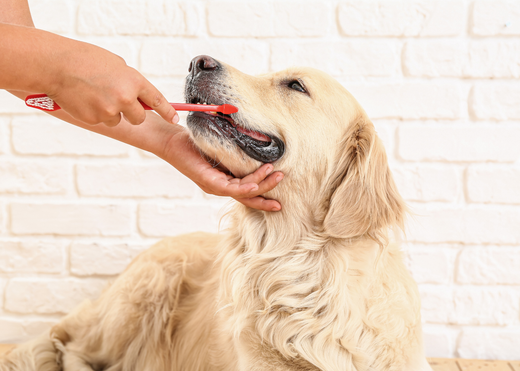February isn't just about spreading love; it's also Pet Dental Health Month!
As a responsible pet parent, you want to ensure that every wagging tail in your household comes with a healthy smile.
Today, we're sinking our teeth into the importance of dental health for your furry friends and how you can keep those canines gleaming.
Pet Dental Health Month: What's the Bark About?
Pet Dental Health Month, celebrated every February, is a dedicated time to shine a spotlight on the importance of oral care for our four-legged companions.
It's more than just a month on the calendar; it's a reminder to pay extra attention to those pearly whites and take proactive steps to prevent dental issues that could impact your pet's overall well-being.
Chew on This: Periodontal Disease Demystified
Let's break it down in simple terms: Periodontal disease is like the invisible villain that can sneak up on your pet's oral health.
It starts with the buildup of plaque, a sticky film of bacteria, on the teeth. Over time, if not addressed, this plaque hardens into tartar and can lead to gingivitis (inflammation of the gums).
If left untreated, it can progress to periodontal disease, where the structures supporting the teeth, like the gums and bone, become compromised.
Bite-Sized Tips for a Healthy Smile
1. Dental-Friendly Diet:Choose a natural dog food rich in nutrients that support dental health. Look for options with ingredients like seaweed, which can help prevent the formation of plaque.
2. Chew on Chew Toys & Treats: Providing your pup with dental-friendly toys or chews can help reduce plaque and tartar buildup. Opt for toys designed to promote dental health, ensuring your furry friend has a blast while keeping their teeth in top-notch condition.
3. Regular Brushing Routine: Yes, you can brush your dog's teeth! Use a pet-friendly toothbrush and toothpaste, and make it a positive experience. Start slow, reward your pup, and gradually build up to a regular brushing routine.
Using a dental supplement also helps in controling plaque formation.
4. Professional Dental Check-ups: Schedule regular dental check-ups with your veterinarian. Professional cleanings are essential for addressing plaque and tartar that brushing alone may not eliminate. But your vet will be the judge of that.
5. Stay Alert to Signs: Keep an eye out for signs of dental issues, such as bad breath, red or swollen gums, difficulty eating, loss of appetite, or excessive drooling. If you notice anything unusual, consult your vet promptly.
By taking a proactive approach to your pet's dental health, you're not just preventing bad breath – you're ensuring a happier, healthier life for your furry family member.
This Pet Dental Health Month, let's celebrate those captivating canines and feline grins by embracing the joy of a healthy smile.
Cheers to brighter smiles!
Want to be the first to get your paws onto the hottest topics? Subscribe to our newsletter!
--------------------------------------------------------------------
The Doggy Grub blog is dedicated to helping dogs and their owners achieve happier, healthier lives, changing the way we feed our dogs one bowl at a time! If you would like to know more about our fresh food head to Doggy Grub










